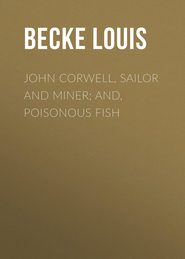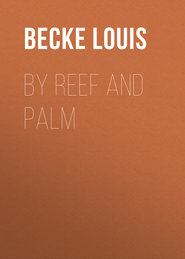По всем вопросам обращайтесь на: info@litportal.ru
(©) 2003-2024.
✖
The Strange Adventure Of James Shervinton
Настройки чтения
Размер шрифта
Высота строк
Поля
“I, William Henry Hayes, master and owner of the brig Leonora, of Shanghai, hereby notify all and sundry that the barque Agostino Rombo, of Leghorn, as she now lies on this reef, has been purchased by me from Captain Pasquale Lucchesi, and any person attempting to remove any of her deck-houses, spars, anchors, or cables, or certain nickel ore in the lower hold, are liable to be indicted for piracy. But all anchors, cables, and ground tackle generally may be removed on payment of 250 dols. to my native agent on this island.”
From the main deck we ascended to the poop, and went below into the now darkening cabin, which we found was gutted of everything of value, except the captain’s and officers’ bedding, which had been tossed aside by Hayes and his crew, and which even the natives of Ujilon had regarded as too worthless to take away, though many a poor sailor man, shivering in northern seas, would have clutched at them as eagerly as a Jew pawnbroker would clutch at a necklace of pearls or a diamond-set tiara. The panelling of the main cabin was painted in white and gold, and presented a very handsome appearance, and on the door of every stateroom was an exceedingly well-painted picture of some saint renowned in history—evidently the owners of the Agostino Rombo were of pious minds. Underneath one of these pictures, that of St. Margaret of Hungary, was scribbled in pencil, “Maggie is my fancy. Frank Hussey, mate brig Leonora.”
I scratched out the ribald words with my knife, and then we went up through the companion to the poop, and looked along the deserted deck, whose once white planking was now cracking and discolouring under the fierce rays of the torrid sun, to which it had been exposed for four months.
We sat down together on a seat, which was placed for-ard of the skylight, and gazed at the lofty masts and spars, which, denuded of all their running gear, stood out stark, grim, and mournful against the rays of a declining sun. On the fore-topgallant yard a frigate bird and his mate stood, oblivious of our presence, and looking shoreward at the long, long line of verdure clothing the islets four miles away.
“Simi,” said Niâbon, clasping her little brown hands together at the back of her head, and leaning against the skylight, “we must return to the canoe ere the tide riseth, for, see, the sun is low down, and Lucia will think that some harm hath befallen us if we delay.”
She spoke in Samoan, the language she generally used when we were alone, for she could express herself better in it even than in English, so she said, though both Lucia and myself had often told her, not banteringly, that her English was sweet to hear.
“Heed not the sinking sun, Niâbon,” I replied, in the same language, “the tide will not yet cover the reef for an hour or more, and the night will be bright and clear.... Niâbon, turn thy face to me.”
I took her hand and drew her closer to me.
“Niâbon, I love thee. I have loved thee since the time when thou first saidst to me, ‘Shall I give thee sleep?’ And for ever since hast thou been in my mind. See, I have loved no other woman as I love thee, and it is my heart’s desire to make thee my wife.”
She drew herself away from me with blazing eyes.
“Thy wife, thy wife! Simi, what madness is this? Hast thou no eyes to see? Is thy mind so dull that thou dost not know that Lucia hath loved thee, and that even at this moment her heart acheth for thy return. Dost thou not know?”
“I care not for her but as a friend,” I said hotly; “‘tis thee alone I desire. Thou art always in my mind, and I will be good and true to thee, Niâbon; for I love thee well. Be my wife. Together thee and I–”
The angry light in her eyes died out, and she placed her cheek to mine.
“Simi, I care more for thee than for any one in the world, save Lucia, and Lucia hath all my heart and all my love. And she so loves thee, Simi—she so loves thee that it is her heart’s desire to be thy wife.... Come, dear friend, let us return and forget all but that Lucia awaits.”
She passed her hand softly over my face, pressed her lips to my forehead, and then I followed her down from the silent deck on to the reef, and thence onwards to the canoe.
CHAPTER XV
All that she said to me that night as we returned over the stilly waters of the lagoon to our companions, I cannot now remember; I only know that as she sat facing me, and I paddled slowly and dreamily along, I promised her, dully and mechanically, to tell Lucia that night that I loved her.
“And she and thee will be happy, very happy, Simi. Her heart went out to thee from the very first. And children will come to thee, and I shall see them grow—the boys strong and brave as thou art, and the girls fair and sweet as Lucia—and yet shalt thou have thy heart’s desire, and be spoken of as a man who did a great deed… a great voyage… and all that hath been done by the three men of whom thou hast so often thought will be but as little compared with this voyage of thine. And she so loves thee, Simi; ah, she so loves thee.”
The soft murmur of her voice enthralled, took such possession of me mentally and physically, that I know not what I answered except that I said again and again, “Ay, I love her, I love her, and I shall tell her of my love, and that she, and she alone, is my heart’s desire.”
How long we were in getting back to the island I cannot tell, but I do remember that it was quite dark, and both Niâbon and myself were paddling vigorously when we heard Tepi’s load hail of welcome, and a canoe shot up on the beach, and Lucia came towards me with outstretched hands.
“Jim, oh Jim! I thought you were never coming back,” she said.
I folded her in my arms and kissed her. “Lucia, dear, dear Lucia! Will you be my wife? For I love you,” and then, scarcely knowing what I was doing, I strained her almost savagely to my bosom, and kissed her upturned face again and again.
“Jim, dear, dear Jim,” and her soft arms were around my neck, “and I love you too! I have loved you almost from the day you first came to Taritai, and Niâbon has told me that one day you would tell me that you loved me… that some day you would speak… Jim dearest, bend down; you are so tall, and I am so little; ah, Jim, I am so little, but my heart, dear, is so big with love for you, that I feel that I could take you in my arms, and kiss you as you now kiss me. Jim, dear, I never, never knew what love meant till now.”
A bright burst of flame illumined the beach, and Niâbon with a torch in her hand was standing at the water’s edge.
“The night is fair and good, and the wind is from the east. Let us away, dear friends.”
Her voice seemed to reach me as if from far, far away, though her dark face with the deep luminous eyes were so near, and, as she spoke, the boat, with Tepi and Tematau standing erect and waiting, grounded gently on the strand.
“Yes, yes, we shall sail to-night,” I cried exultantly, as I again pressed Lucia to my heart, and showered passionate kisses upon her lips, “we shall sail, Lucia my dearest; on, and on, and on, to the north-west, my beloved, till we come to our journey’s end, and you and I shall never part again, no never, never, my dearest.”
“Ay, never, never shall ye two part again,” cried Niâbon, casting down her torch; “man with the strong and daring hand, and woman with the fond and tender heart. Thy lives are forever linked together. Quick, give me thy hand, Lucia, my dove, my own, my own!” She sprang towards us, and took Lucia’s hand in hers, and almost tore off her wedding ring, and then flung it far out into the lagoon.
“Sink, sink, thou ring of misery—thou golden circle which should have meant love and trust and happiness, but brought naught but hate and treachery and poison to her who wore it. Sink, accursed thing.”
“Oh, Jim, Jim!” and Lucia turned her streaming eyes to mine, “it was my wedding ring, and when he gave it to me, I think he loved me, wicked and cruel as he was afterwards. Oh, Niâbon, Niâbon!” In a moment Niâbon’s arms were around her. “My sweet, my sweet! thou art to me more than life,” she whispered, “I love thee so, Lucia. I love thee so that I would die for thee! Heed not the ring, for now thou hast beside thee a good man—true, brave, and strong—one whose love will forever shield thee. Come, my dearest, come with me to the boat.”
They went down the beach together, with arms around each other’s waists, and their footsteps guided by the still-burning torch lying on the sand. I followed, and in another minute I had the tiller in my hand, and told Tepi to push off, as Tematau ran up the jib.
“How now for the passage?” I cried, as I slipped my arm around Lucia’s waist, and her lips met mine, “how now for the passage, Tepi? Canst see? Canst see, Tematau?”
Niâbon placed her hand on mine.
“Have no fear, Simi. The wind is fair and the passage through the reef is wide, and the ship on the right hand is a good guide. See, her masts stand out clear against the sky. And give me the tiller, for thou and Lucia are tired. So sleep—sleep till the dawn, and Tematau and Tepi and I shall keep watch through the night. How shall I steer?”
“North-west, north-west,” I muttered, as Lucia laid her cheek to mine, “north-west, but call me if the wind hauls to the northward.”
She bent oyer Lucia and touched her face softly.
“Sleep, dear one, sleep till dawn,” she said in a whisper, and then with a smile she turned to me.
“Simi, thou too art tired, and must sleep even as Lucia sleepeth now. See, her eyes are closed. How sweet and fair she is as she sleepeth! Ah, how sweet! So, let me touch thy face.” She pressed her soft hand on my brow, and then, with Lucia’s head pillowed on my breast, I slept.
CHAPTER XVI
For seventeen days we made good progress to the north-west, though we met with such very heavy weather when between Minto Breakers Beef, and the island of Oraluk, that I had to run back to the latter place for shelter, and all but missed it. Although so small, it is very fertile, and the natives were very hospitable, Niâbon and Lucia being given a room in the chief’s house, and I and my two men were given a house to ourselves, where we were very comfortable during our stay of four days, though unable to get about on account of the pouring rain, which hardly ceased for an hour. The chief’s house was quite near to that in which we were quartered, so I spent a good deal of my time there, for although I cannot say that I was really in love with my future wife, her gentle endearments, and the happiness that shone in her dark eyes when I was with her gave me a certain restfulness, and I was well content.
We had long since decided as to our future. After our marriage she was to stay with her sister, or with my friends, the Otano’s, on Guam, whilst I made my way to my friend at Amboyna, and got him to provide me with such an amount of trade goods that when I returned to Guam I should be in a position to at once begin trading operations either in the Marianas, with Guam for my headquarters, or else choose some suitable place in the Caroline Archipelago. The boat, I had no doubt, I could sell at San Luis d’Apra, or San Ignacio, and this I intended to do if a fair price was offered me. Then I would take passage in one of the Spanish trading schooners to Manila, and from there I could easily get to Amboyna; and all going well, it was more than likely that my friend would lend or sell me on easy terms, one of his own small trading vessels, for he had half a dozen or more employed throughout the Moluccas, and on the coast of the Phillipine Islands.
On the second day after our arrival on Oraluk, the rain cleared off for an hour, and I went over to the chief’s house, and found Lucia conversing in Spanish with some native women who could speak it brokenly, for years before there had been a Jesuit mission on the island, but it had been abandoned, and the two priests, after a stay of five years, had gone back to Manila. Niâbon was not in the house—she had gone into the forest with some of the young girls, Lucia said, as she bade me come in and sit down.
“She is a strange girl, Lucia. She seems to love to be in the forest, or walking on the cliffs or mountain tops. I wish I knew the true story of her life.”
Lucia shook her head. “She will not tell it, Jim, and I am sure she does not like to be questioned even by me. But yet she has told me a little, and there can be no harm in my telling you—I am sure she would not mind.”
“No, why should she mind?”
“She told me that her very first memories of her childhood go back to when she was a child of six at Manhiki. She lived alone with her mother in a little hut quite apart from the other people. Even then she says she knew that her mother was a ‘witch-woman’ and was greatly feared by the natives, who yet came to her for charms and medicines. Who her mother was she does not know—but she is quite certain that she was a full-blooded Polynesian, though not a native of Manhiki. Her father she had never seen, nor had her mother ever made even the faintest allusion to him, and Niâbon herself had never dared question her on the subject. She told me, however, that she imagined he was a white man.”
“I am almost sure he was,” I said; “she certainly is not a full-blooded native.”
“I am sure of it too. But she does not like to be thought anything but a pure native. Why, I cannot tell, and have never asked her her reasons.”
“Is her mother still living?”
“I do not know and do not like to ask her. She told me that she, her mother, and Tematau had left Manhiki and wandered through the islands of the South Pacific for many years. Tematau she says is a blood relation. He only took service as head boatman with Krause so as to be near her, for from the very first day she saw me, she determined to live at Taritai. And we have always been the closest friends.”











